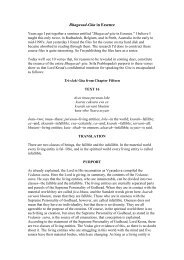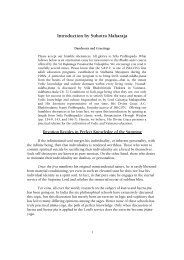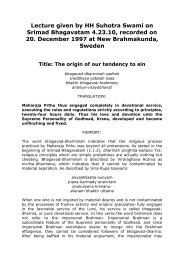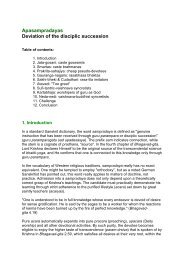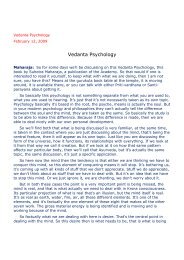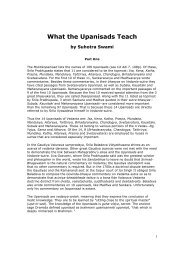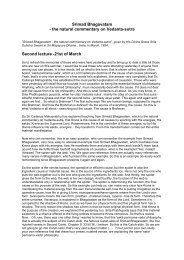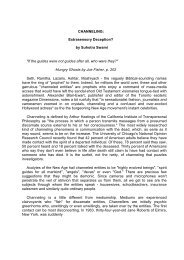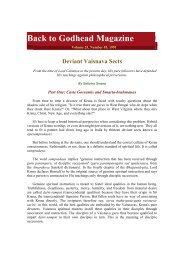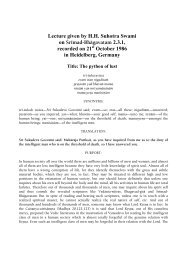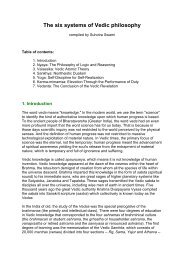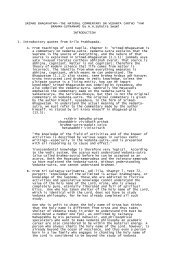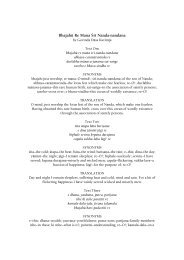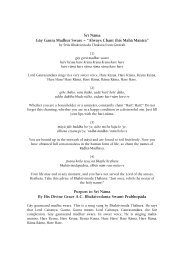Danda 1995 - Suhotra Maharaja Archives
Danda 1995 - Suhotra Maharaja Archives
Danda 1995 - Suhotra Maharaja Archives
- No tags were found...
Create successful ePaper yourself
Turn your PDF publications into a flip-book with our unique Google optimized e-Paper software.
MODE OF GOODNESSQuestion from Nanda Kumar dasAugust 3, <strong>1995</strong>Some devotees here read Kundali Prabhus book and are gradually becommingconvinced that without comming to the mode of goodness one cannot performdevotional service propperly. What is your opinion about this.Answer by <strong>Suhotra</strong> SwamiAugust 4, <strong>1995</strong>I have only briefly examined his book, *The Nectar of Discrimination*. It wouldnot be proper for me to directly criticize it, since I am not familiar enoughwith the text to make an in-depth analysis. I do know that there are severalGBC men who have read it much more carefully than I. Their comments reflect aconcern about the author's intentions. But I do not wish to enter into adiscussion about these comments either.What I can say is based upon my own experience as GBC. In my zone, I had todeal with a few cases of devotees who, after reading this book or hearing hislectures on the subject of the three modes, became 1) rather mental about theirown devotional service, and 2) became critical of other devotees, includingtheir temple president, because according to their new-found discrimination theycould see that other devotees are under the influence of the modes of nature.They concluded that *N.O. Discrimination* gave them the right to reject theleadership of such devotees. There was one bhakta who, stubbornly defending hiscritical attitude by citing *N.O. Discrimination*, soon left devotional servicealtogether.This small experience of mine leads me to conclude that the assumptions thesedevotees formed after reading *N.O. Discrimination* have more to do with jnanayogathan bhakti-yoga. The jnanis believe that by discrimination they canattain the conception of aham brahmasmi, sešiny themselves as Brahman, andseeing how all other living entities are in Maya. To cultivate such aconception within the ISKCON association is without a doubt a dangerousenterprise. It can easily lead to Vaisnava aparadha.As I said to a temple president who raised this question with me before, to readsuch a book as this without forming wrong assumptions seems to require a levelof discrimination that we do not normally find in bhaktas/bhaktins and youngerinitiated devotees. It is therefore more adviseable that the devotees simplylearn about the three modes from Srila Prabhupada's books under the guidance oftheir spiritual masters.KARMAQuestion from Bhakta Jan MaresAugust 13, <strong>1995</strong>Trying to find out who is directly in charge of karma I have found two differentinformation (quoted below). Could you please clarify this apparentcontradiction?SB 1.13.46 p., 1st par.: The highest perfectional project of philanthropicactivities is to engage everyone in the act of preaching bhakti-yoga all overthe world because that alone can save the people from the control of maya, orthe material nature represented by kala, karma and guna, as described above.



